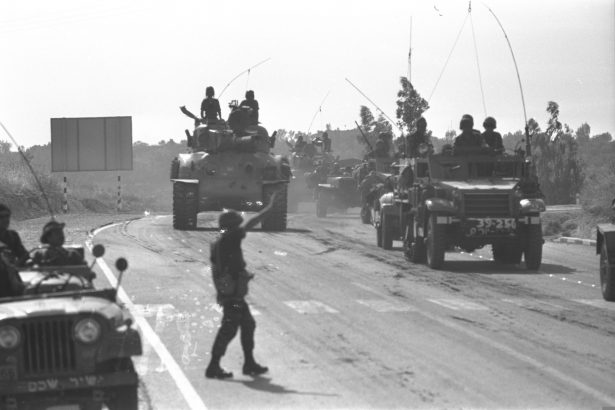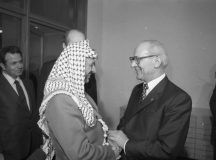One of America’s foremost political thinkers, Michael Walzer wrote his seminal book Just and Unjust Wars in 1977. The book was born a decade earlier when, as an anti-Vietnam war activist, Walzer found himself defending Israel’s pre-emptive strike against Egypt. ‘I had to explain the politics of distinction’ he recalls, and make clear that ‘wars are just and unjust’.
For some weeks in 1967 I was running around the US giving speeches against the Vietnam War. I was an activist in Vietnam Summer, an effort to produce anti-war community organising in American cities. (My own city was Cambridge, Massachusetts.) I had a standard speech, sharply critical of the war and even more critical of the conduct of the war. And then, suddenly, I was also speaking in defence of the Israeli pre-emptive strike against Egypt. My audiences were sceptical, often hostile. They were mostly anti-every-war – or, at least, every American and soon every Israeli war: selective pacifists. But there were also American hawks, defenders of the Vietnam War, demanding to know how I could reconcile my opposition to one war while supporting another. I had to explain the politics of distinction: wars are just and unjust. That moment was the origin of my book Just and Unjust Wars, published 10 years later.
Growing up as a Jewish kid in New York City during World War Two was a kind of immunisation against pacifism. One thing I knew: the fight against Nazi Germany was necessary and just. Therefore, not every war was unjust. Peace is better, of course; no one who lived through either World War, or who has studied the histories, could possibly be a militarist. But peace isn’t better if it requires the appeasement of brutal dictators, if it puts millions of people at risk, facing persecution, ethnic cleansing, or mass murder. So every war and every argument for going to war needs to be critically scrutinised. No war gets a pass. But ‘peace in our time’ also needs critical scrutiny.
It took many months to construct the anti-Vietnam argument – or, at least, my version of the argument. There were reasons to defend a decent regime in the South (had there been a decent regime) against a looming communist tyranny. It was only after the Vietcong had won the famous ‘battle for hearts and minds’ that I was able to say with certainty that the American war was unjust. The Six-Day War required a more immediate response. It’s been debated now for many years, but those of us in the political field, so to speak, had to take a stand, for or against, very fast.
Well, not that fast: in the weeks before the Israeli pre-emptive strike there was at least a little time for argument – and for agitation. Along with several thousand American university teachers, I signed a statement calling on the US government to take immediate action to end the Egyptian blockade of the Straits of Tiran. ‘Sources close to the White House’ suggested that US policy makers might be more inclined to listen if we weren’t, most of us, active opponents of US policy. But mostly in those weeks agitation was less central in my life than anxiety.
Anxiety is very important in understanding the argument for pre-emption. The closing of the Straits and then the Egyptian army’s occupation of the Sinai, supposedly a neutralised area and a buffer zone, produced real fear in Israel. The bombastic threats to Israel’s existence broadcast from Cairo aggravated the fear, which spread by a kind of contagion to Jews in the Diaspora. The UN’s Sinai ‘peacekeeping’ force fled before the Egyptians; the Soviet Union was Nasser’s ally; the position of the US was unclear – Israel seemed to stand alone.
We are told now by revisionist historians that we should have recognised the bombast and ignored it – and that Israeli generals were unafraid and, indeed, eager to fight. No doubt, the Egyptian generals were also unafraid and, at least rhetorically, eager to fight. But then comes a difference: the Egyptian public, by all reports, was excited by the prospect of war; the Israeli public definitely was not. In Israel, fear was intense, widely reported, openly discussed. This had a lot to do with recent Jewish history, but it was also objectively true that Israel could not afford to lose a war. The state was too new, too vulnerable, too precarious; everyone believed that its existence was at stake. The existence of Egypt was not at stake.
Pre-emption is justified by what the law books call an ‘imminent threat’. Preventive wars, by contrast, are fought against distant, speculative threats. They require the long view, and they have to be defended to sceptical citizens who have no immediate reason to be afraid. They know that there are other things to do, short of war. A preventive attack is, to my mind, almost always indefensible. Pre-emption has a very different timeline; it is most clearly justified when the attack doesn’t require a lengthy defense. The danger is immediately recognisable – and one of its signs is fear.
In the case of Israel in 1967, this obviously wasn’t a paralysing fear; Israelis prepared for a war with determination but also with an extraordinarily lively or, better, a passionately grim sense of the dangers. The fear we felt in the American Diaspora was a pale reflection of this, but it did have some striking effects. Many left-wing Jews, who had for years been opposed to Zionism, suddenly discovered that they did not want the Jewish state to be destroyed – and they revised their politics. But that wasn’t the only kind of Jewish ‘conversion’ in 1967. In fact, there were two groups of converts: those who became Zionists before the war, responding to the fear that Israel might fall, and those who became fierce Zionists afterwards, responding to the triumph and the rise of ‘Mighty Israel’. The first group came mostly from the Left, the second mostly from the Right.
Israeli triumphalism and messianism after the war are actually evidence of the fear that preceded it. Without the acute sense of danger, the war would never have been conceived as a miraculous deliverance. This is an old pattern, first seen in the biblical story (Exodus 14) of the Israelites at the sea, ‘greatly frightened’ by the approaching Egyptian chariots and then rescued by divine intervention. The greater the fear, the greater the miracle. Of course, there was a better response to the Six-Day War: to recognise how lucky Israel had been to find the whole Egyptian air force on the ground, waiting to be destroyed – and then to develop a policy, secular and rational, that might make another war unnecessary. But the germ of settler zealotry can be found in the anxiety of late May and early June, 1967.
It is a disturbing piece of historical irony that what justified the war also helped to produce, down the road, the most unjust consequences of the war. 50 years on, it is important both to remember the fear and acknowledge the injustice. A just war is no guarantee of a just peace. Of course, the religious zealots in Israel are not the only cause of the injustice; the rejectionist policies of all the Arab states in the aftermath of the war played a major part in shaping the political stalemate and the wars to come. And now there are religious zealots on the Palestinian side, eager for a triumph of their own and a new injustice.
I remember how glad I was that my colleagues on Dissent magazine, many of them hostile to Jewish nationalism, joined me in the political/intellectual defence of Israel. In retrospect, however, that seems an easy and obvious response. The heroes of 1967 are the Israelis who fought in the war and then, immediately after, opposed the occupation and the triumphant settlers – and who are still engaged, still in opposition today.






































Comments are closed.